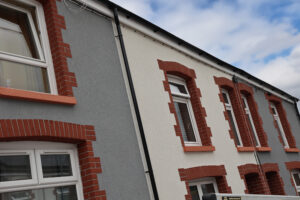PAS 2035 is an industry standard developed by the British Standards Institution (BSI) in collaboration with industry experts. Published in 2019, it serves as a guide for the retrofit of domestic buildings, emphasizing energy efficiency and sustainability. The standard outlines a systematic approach to retrofitting, addressing various aspects, including energy assessment, design, installation, and monitoring.
PAS 2035 serves as a comprehensive and structured framework for retrofitting domestic buildings, providing guidelines for the installation of EWI. By incorporating the principles of PAS 2035 into EWI projects, stakeholders can ensure not only compliance with industry standards but also the delivery of energy-efficient and sustainable building improvements. This integration contributes to the overarching goal of creating a more environmentally conscious and resilient built environment.
Key Principles of PAS 2025
Holistic Approach
PAS 2035 promotes a holistic perspective, considering the entire building and its interaction with its environment. This is crucial in the context of EWI, as it ensures that the retrofit measures integrate seamlessly with the overall building performance.
Risk Assessment
One of the key features of PAS 2035 is its emphasis on risk assessment. Before implementing any retrofit measures, a thorough evaluation of potential risks is conducted. This is especially relevant in EWI projects, where factors like substrate conditions and structural integrity must be carefully considered.
Quality Assurance
The standard places a strong emphasis on quality assurance throughout the retrofit process. This is particularly important for EWI, where the effectiveness of the insulation material and its installation directly impact energy efficiency and occupant comfort.
PAS 2035 and the Retrofit Process
Energy assessment
The first step in the retrofit process under PAS 2035 is conducting a comprehensive energy assessment. In the case of EWI, the assessment considers factors such as existing insulation levels, thermal bridging, and potential heat loss through external walls.
Design and specification
Once the energy assessment is complete, the next stage involves designing the EWI retrofit measures. This includes selecting appropriate insulation materials, determining the thickness of the insulation layer, and addressing any specific challenges posed by the building’s architecture. PAS 2035 ensures that the design aligns with the overall retrofit objectives.
Installation and monitoring
PAS 2035 stresses the importance of employing qualified installers and adhering to best practices to achieve optimal results. Additionally, the standard advocates for continuous monitoring to assess the performance of the retrofit measures over time, ensuring that the desired energy efficiency goals are met.
Andy Fletcher, Sales Director comments: “PAS 2035 provides the appropriate framework, to give customers and clients the confidence that an Energy Efficiency based Retrofit will be hugely beneficial. Properties will now be assessed, designed, installed and monitored, to ensure an improved quality of life for those residents, who are often the most vulnerable. We look forward to playing our part in contributing to this journey, through our External Wall Insulation Systems offering, as we embrace the raise in standards aimed at significantly improving standards of living within the target sectors.”
For more information on PAS 2035 please contact us at: [email protected] or call us on 0800 6124662.

